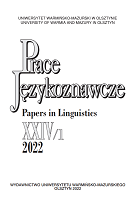Wie äußert man sich gendergerecht? Kontrastive Bemerkungen zur Movierung im Deutschen und im Polnischen inspiriert durch den Genderdiskurs
How to express oneself in line with gender equality? A few contrastive remarks concerning ‘motion’ in German and Polish inspired by gender discourse
Author(s): Anna DargiewiczSubject(s): Language studies, Gender Studies, Theoretical Linguistics, Comparative Linguistics, Western Slavic Languages
Published by: Wydawnictwo Uniwersytetu Warmińsko-Mazurskiego w Olsztynie
Keywords: motion; gender discourse; motion suffixes; visual ways of marking gender; gender issues;
Summary/Abstract: The aim of the article is to discuss the ‘motion’ word-formation process in German, and contrast it with a correspondent word-formation process in Polish in order to present relevant similarities and differences between the two languages visible in the collected empirical material. Both languages under analysis have created semantic as well as cultural and social groundwork enabling the development of the ‘motion’ word-formation category. This process has been motivated primarily by debates taking place both in Germany and in Poland which referred to the ways languages should respond to gender issues (the so-called gender discourse). Both German and Polish offer means of identifying the gender of a given name. Most motion suffixes are used to derive feminine names from their masculine equivalents. Derivation of masculine versions from feminine names is very rare in both languages. It is worth emphasizing that motion in both languages provides very interesting opportunities for linguistic creativity. This creativity and the need for accurate specification of academic degrees, jobs and positions related to feminine or neuter genders often become a subject of heated debates. Additionally, German language users demonstrate considerable creativity as regards visual representations of references to a given gender, e.g., by inserting graphic symbols into words, as is the case of the word Student*innen – gender asterisk.
Journal: Prace Językoznawcze
- Issue Year: 24/2022
- Issue No: 1
- Page Range: 117-134
- Page Count: 18
- Language: German

